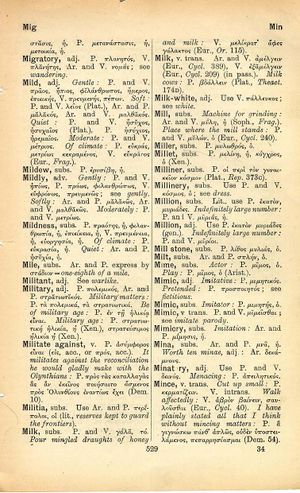mina
Ὕβρις κακὸν μέγιστον ἀνθρώποις ἔφυ → Malum est hominibus maximum insolentia → Das größte Übel ist für Menschen Übermut
English > Greek (Woodhouse)
subs.
Ar. and P. μνᾶ, ἡ. Worth ten minae, adj.: Ar. δεκάμνους.
Latin > English (Lewis & Short)
mĭna: (mna, Plin. 35, 10, 36, § 107), ae, f., = μνᾶ>.
I A Greek weight of a hundred Attic drachmas, a mina, Plin. 21, 34, 109, § 185; Rhem. Fann. de Ponder. 32 sq. —
II A Greek money of account.
A The silver mina; this was of 100 Attic drachmae or Roman denarii (about $18.05 of our currency): argenti, Plaut. As. 2, 3, 16; id. Poen. 2, 21; 5, 5, 8 al.—Also absol.: mina, Plaut. Trin. 2, 4, 2; id. Ps. 3, 2, 87; id. Poen. 5, 6, 22 al.; Cic. Tusc. 5, 32, 91; id. Leg. 2, 27, 68: minae bonae mala opera partae, Plaut. As. 3, 3, 144.—
B Auri, the mina of gold, of five times the value of the silver one: alia opust auri mina, Plaut. Truc. 5, 44; id. Mil. 5, 27.
mĭna: ae, f.
I adj., smooth: mina ovis, smooth-bellied, with no wool on the belly: mina (id est ventre glabro), Varr R. R. 2, 2, 6: minae oves, a play on the double meaning of the word (v. 1. mina, II.), Plaut. Truc. 3, 1, 9.—
II Subst.: mĭna, ae, f.: minam Aelius vocitatam ait mammam alteram lacte deficientem, quasi minorem factam, Paul. ex Fest. p. 122 Müll.
Latin > French (Gaffiot 2016)
(1) mĭna,¹¹ æ, f. (μνᾶ), mine, poids de cent drachmes chez les Grecs : Plin. 12, 62

